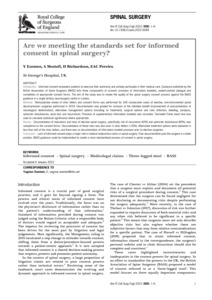Esemen, Y; Mostofi, A; Richardson, D; Pereira, E
(2023)
Are we meeting the standards set for informed consent in spinal surgery?
Ann R Coll Surg Engl, 105 (4).
pp. 372-377.
ISSN 1478-7083
https://doi.org/10.1308/rcsann.2022.0049
SGUL Authors: Pereira, Erlick Abilio Coelho
![[img]](https://openaccess.sgul.ac.uk/114609/1.hassmallThumbnailVersion/rcsann.2022.0049.pdf)  Preview |
|
PDF
Published Version
Available under License ["licenses_description_publisher" not defined].
Download (245kB)
| Preview
|
Abstract
INTRODUCTION: Informed consent empowers patients to exercise their autonomy and actively participate in their medical care. Guidance published by the British Association of Spine Surgeons (BASS) lists three components of consent: provision of information booklets, patient-centred dialogue and completion of appropriate consent forms. The aim of the study was to review the quality of the spinal surgery consent process against the BASS guidance in a single tertiary neurosurgery centre in London. METHODS: Retrospective review of clinic letters and consent forms was performed for 100 consecutive cases of elective, non-instrumented spinal decompression surgeries performed in 2019. Documentation was graded for inclusion of the intended benefit (improvement of pain/prevention of neurological deterioration), alternative management options (including no treatment), surgical options and risks (infection, bleeding, paralysis, sphincter disturbances, dural tear and recurrence). Provision of supplementary information booklets was recorded. Two-tailed Fisher exact test was used to calculate statistical significance where appropriate. RESULTS: Documentation of indications and risks of elective spinal surgery, specifically risk of recurrence (62%) and sphincter disturbance (85%), was suboptimal on the consent forms. Documentation of these risks was also poor in clinic letters (<50%). Alternative treatment options were explained in less than half of the clinic letters, and there was no documentation of information booklet provision prior to elective surgeries. CONCLUSION: Lack of informed consent plays a major role in medical malpractice claims in spinal surgery. Poor documentation puts the surgeon in a liable position. BASS guidance could be implemented to create a more standardised process of consent in spinal surgery.
Statistics
Item downloaded times since 08 Aug 2022.
Actions (login required)
 |
Edit Item |



